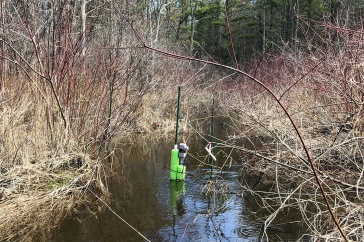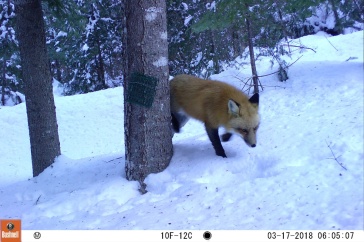
Rivers in tropical climates are often associated with supporting diverse ecosystems and being great ecotourism destinations, but these tropical rivers may also play an important role in capturing, storing, and preventing organic carbon from converting to carbon dioxide. This prevention can reduce the greenhouse effect, which prevents heat from escaping the Earth's atmosphere and contributing to a changing climate that is responsible for extreme weather events around the world, including record-breaking storms, floods, and droughts.
"This information is important because we’ve demonstrated that the very high stream flows following major storms bury a large amount of organic carbon sediment offshore from steep tropical island mountain chains," said New Hampshire Agricultural Experiment Station research Bill McDowell, professor of natural resources at the UNH College of Life Sciences and Agriculture. "So it’s another sink or storage place for carbon that we haven’t really accounted for with global models in the past and another way that carbon is sequestered and prevented from reaching our atmosphere."
Read the published article, Extreme rainstorms drive exceptional organic carbon export from forested humid-tropic rivers in Puerto Rico, in Nature Communications journal.
Want to learn more about Bill McDowell's research? Visit the UNH Water Quality Analysis Laboratory website.
The research, recently published in Nature Communications journal, was co-authored by a team of scientists that included McDowell and researchers at the U.S. Geological Survey (USGS), the U.S. Forest Service, and the University of Pennsylvania. The team studied geological carbon cycles of the Icacos and Mameyes rivers in the Sierra De Luquillo Mountains of eastern Puerto Rico.
For this study, McDowell and his colleagues used 25 years (1991-2015) of water samples collected from within the Luquillo Experimental Forest at USGS stream gaging stations located on both rivers, as well as from the Lower Rio Mameyes Water Quality Project. The researchers were able to examine the amount of sediment in the rivers following major rainfall events, determining that upwards of 65 percent of particulate organic carbon (POC) runoff was buried in offshore sedimentary deposits in the ocean.
In the context of the global carbon cycle, it’s important to note that the extreme weather events that move all this material from the land to the ocean will likely increase in the future as the earth warms, so it is critical to establish a baseline now.
"We believe it’s one of the longest running studies of tropical stream chemistry on earth," said McDowell. "And in the context of the global carbon cycle, it’s important to note that the extreme weather events that move all this material from the land to the ocean will likely increase in the future as the earth warms, so it is critical to establish a baseline now."
"The results from Puerto Rico also suggest that with extreme storms, other coastal rivers with small floodplains such as the rivers in New England may also be delivering more sediment and carbon to deeper marine sediment repositories than previously realized," McDowell added.
McDowell—who has been researching the biological, geological, and chemical cycles of the streams, forests, and watersheds in New Hampshire, Puerto Rico, and around the world for more than four decades—believes that findings from this study can add to a broader understanding of how river systems can help mitigate climate change. The Sierra De Luquillo Mountains are an island arc mountain chain, similar to tropical island arc mountain ecosystems around the globe that could also feed similar carbon sinks.
This material is based upon work supported by the NH Agricultural Experiment Station, through joint funding of the National Institute of Food and Agriculture, U.S. Department of Agriculture, under award number 1019522, and the state of New Hampshire.
Read the published article, Extreme rainstorms drive exceptional organic carbon export from forested humid-tropic rivers in Puerto Rico, in Nature Communications journal.
Want to learn more about Bill McDowell's research? Visit the UNH Water Quality Analysis Laboratory website.
-
Written By:
Nicholas Gosling '06 | COLSA/NH Agricultural Experiment Station | nicholas.gosling@unh.edu
















































